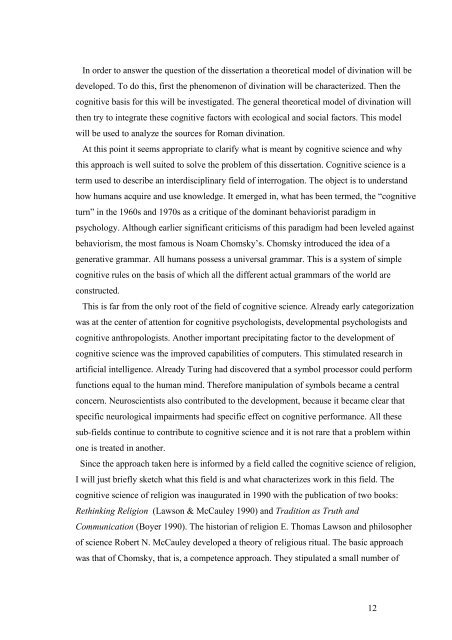The dissemination of divination in roman republican times
The dissemination of divination in roman republican times
The dissemination of divination in roman republican times
You also want an ePaper? Increase the reach of your titles
YUMPU automatically turns print PDFs into web optimized ePapers that Google loves.
In order to answer the question <strong>of</strong> the dissertation a theoretical model <strong>of</strong> <strong>div<strong>in</strong>ation</strong> will be<br />
developed. To do this, first the phenomenon <strong>of</strong> <strong>div<strong>in</strong>ation</strong> will be characterized. <strong>The</strong>n the<br />
cognitive basis for this will be <strong>in</strong>vestigated. <strong>The</strong> general theoretical model <strong>of</strong> <strong>div<strong>in</strong>ation</strong> will<br />
then try to <strong>in</strong>tegrate these cognitive factors with ecological and social factors. This model<br />
will be used to analyze the sources for Roman <strong>div<strong>in</strong>ation</strong>.<br />
At this po<strong>in</strong>t it seems appropriate to clarify what is meant by cognitive science and why<br />
this approach is well suited to solve the problem <strong>of</strong> this dissertation. Cognitive science is a<br />
term used to describe an <strong>in</strong>terdiscipl<strong>in</strong>ary field <strong>of</strong> <strong>in</strong>terrogation. <strong>The</strong> object is to understand<br />
how humans acquire and use knowledge. It emerged <strong>in</strong>, what has been termed, the “cognitive<br />
turn” <strong>in</strong> the 1960s and 1970s as a critique <strong>of</strong> the dom<strong>in</strong>ant behaviorist paradigm <strong>in</strong><br />
psychology. Although earlier significant criticisms <strong>of</strong> this paradigm had been leveled aga<strong>in</strong>st<br />
behaviorism, the most famous is Noam Chomsky’s. Chomsky <strong>in</strong>troduced the idea <strong>of</strong> a<br />
generative grammar. All humans possess a universal grammar. This is a system <strong>of</strong> simple<br />
cognitive rules on the basis <strong>of</strong> which all the different actual grammars <strong>of</strong> the world are<br />
constructed.<br />
This is far from the only root <strong>of</strong> the field <strong>of</strong> cognitive science. Already early categorization<br />
was at the center <strong>of</strong> attention for cognitive psychologists, developmental psychologists and<br />
cognitive anthropologists. Another important precipitat<strong>in</strong>g factor to the development <strong>of</strong><br />
cognitive science was the improved capabilities <strong>of</strong> computers. This stimulated research <strong>in</strong><br />
artificial <strong>in</strong>telligence. Already Tur<strong>in</strong>g had discovered that a symbol processor could perform<br />
functions equal to the human m<strong>in</strong>d. <strong>The</strong>refore manipulation <strong>of</strong> symbols became a central<br />
concern. Neuroscientists also contributed to the development, because it became clear that<br />
specific neurological impairments had specific effect on cognitive performance. All these<br />
sub-fields cont<strong>in</strong>ue to contribute to cognitive science and it is not rare that a problem with<strong>in</strong><br />
one is treated <strong>in</strong> another.<br />
S<strong>in</strong>ce the approach taken here is <strong>in</strong>formed by a field called the cognitive science <strong>of</strong> religion,<br />
I will just briefly sketch what this field is and what characterizes work <strong>in</strong> this field. <strong>The</strong><br />
cognitive science <strong>of</strong> religion was <strong>in</strong>augurated <strong>in</strong> 1990 with the publication <strong>of</strong> two books:<br />
Reth<strong>in</strong>k<strong>in</strong>g Religion (Lawson & McCauley 1990) and Tradition as Truth and<br />
Communication (Boyer 1990). <strong>The</strong> historian <strong>of</strong> religion E. Thomas Lawson and philosopher<br />
<strong>of</strong> science Robert N. McCauley developed a theory <strong>of</strong> religious ritual. <strong>The</strong> basic approach<br />
was that <strong>of</strong> Chomsky, that is, a competence approach. <strong>The</strong>y stipulated a small number <strong>of</strong><br />
12


